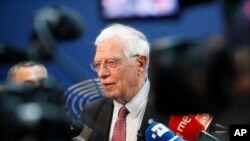The European Union is considering restarting an operation to control migrant trafficking and enforce a U.N. arms embargo on Libya if a shaky truce in the North African country solidifies into a formal cease-fire.
Speaking Monday after an EU foreign ministers meeting in Brussels, the bloc's top diplomat, Josep Borrell, said member states discussed revamping the operation to include monitoring a Libya arms embargo by land as well as by sea.
Known as Sophia, the mission has mostly been combating migrant trafficking off Libya's shores. Its maritime operation ended last March, after Italy said it would no longer welcome migrants rescued at sea.
"We are not going to change but to refocus the mandate of operation Sophia, to refocus especially on the issue of embargo," Borrell said. "The arms embargo has to be controlled not only by sea, because most of the arms goes through the desert.”
Borrell said this means also enforcing the embargo by land and air. He gave no timeline. However, Italy's foreign minister said his country is interested only in the arms embargo aspect of the Sophia operation, not the migrant component.
Borrell spoke a day after foreign powers at a Berlin summit agreed to shore up a fragile truce in Libya, where two rival governments are vying for power and energy resources.
Analysts say Europe is late in concentrating on the Libya crisis, waking up only now to its implications — especially with the recent involvement of Russia and Turkey in the conflict.
EU foreign ministers also discussed a neighboring hotspot — the Sahel — where extremist violence is growing.
Borrell described Libya as a tumor spreading instability across the Sahara. He said roughly 4,000 soldiers and civilians died in the region last year alone.
The EU announced no concrete measures Monday, but French Foreign Minister Jean Yves Le Drian applauded what he described as Europe regaining control in international affairs. France hosted a summit last week to shore up military cooperation with West African countries against growing Islamist militancy in the Sahel.




